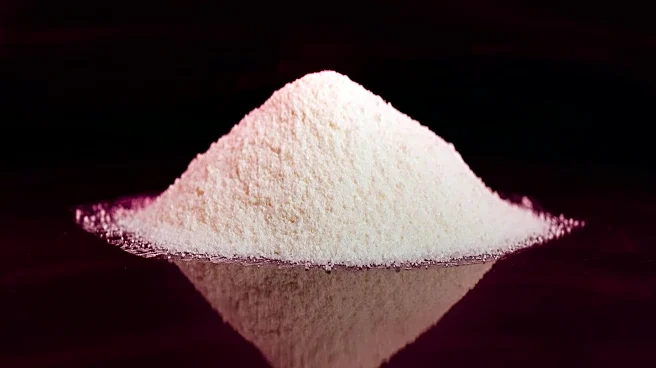What's Happening?
Consumer Reports has released findings indicating that many protein powders and shakes contain concerning levels of lead. The investigation analyzed 23 different protein supplements, including dairy, beef, and plant-based products. More than two-thirds
of these products were found to have lead levels exceeding the safety threshold of 0.5 micrograms per day. Plant-based protein products were identified as having the highest lead concentrations, significantly surpassing those found in dairy and beef-based options. Two specific products, Naked Nutrition’s Vegan Mass Gainer and Huel’s Black Edition, were highlighted as particularly concerning due to their high lead content. Despite these findings, Huel maintains that their products undergo rigorous testing and comply with international food safety standards. Additionally, the report uncovered that some products exceeded safety levels for cadmium and contained inorganic arsenic, both recognized carcinogens.
Why It's Important?
The presence of high lead levels in protein supplements poses significant health risks, particularly to vulnerable groups such as pregnant women and children. Lead exposure can lead to developmental delays, learning difficulties, and other health issues. The findings underscore the need for stricter regulatory oversight in the dietary supplement industry, as the FDA does not currently evaluate these products before they are sold. Consumer Reports has initiated a petition urging the FDA to impose stricter regulations on lead levels in protein products. This report highlights the necessity for enhanced oversight to ensure public safety, similar to recent FDA guidelines for lead in processed baby foods.
What's Next?
Consumer Reports is advocating for the FDA to implement stricter regulations on lead levels in protein supplements. This could lead to increased scrutiny and potential changes in manufacturing practices to reduce lead contamination. The dietary supplement industry may face pressure to improve product safety standards, and consumers may become more cautious about using protein powders and shakes. Companies like Naked Nutrition and Huel may need to address consumer concerns and potentially reformulate their products to meet safety standards.
Beyond the Headlines
The findings raise ethical concerns about the marketing and safety of dietary supplements. The lack of regulatory oversight highlights potential gaps in consumer protection, emphasizing the need for transparency and accountability in the industry. Long-term exposure to lead and other heavy metals could have broader implications for public health, necessitating a reevaluation of dietary supplement safety standards.

















